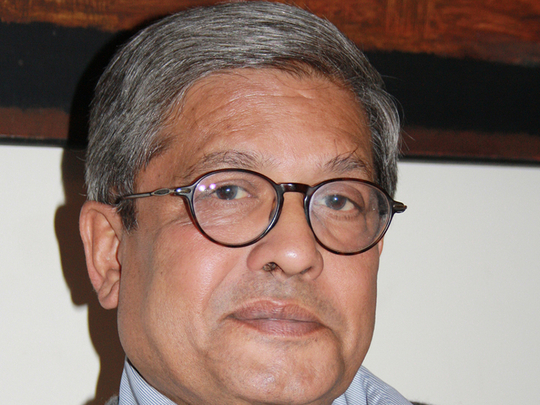
Mumbai: Dileep Padgaonkar, 72, eminent journalist and former editor of Times of India passed away in a Pune Hospital on Friday after a brief illness.
He was admitted to Ruby Hospital on November 18 following a massive heart attack. Later, he suffered multiple organ failure and was on dialysis after his kidney stopped functioning. His death brought on a pall of gloom among the journalistic community, among the print as well as electronic media.
Padgaonkar, who was a part of the three-member interlocutors group for Jammu and Kashmir in 2008 during the former UPA government, began his distinguished career in journalism at a young age.
Born on May 1, 1944, he matriculated from Vincent High School and graduated from Fergusson College, two leading educational institutions in Pune. After acquiring a Bachelor of Arts degree in Political Science and German as his main subjects, he proceeded to Paris where he obtained a diploma in direction and script writing from the Institute of High Cinematographic Studies and received a doctoral degree in social sciences from the University of Paris, Sorbonne.
Three months later, in October 1968, he was appointed Paris correspondent of The Times of India (TOI) and in 1973 he returned to India and served as an assistant editor of TOI in Mumbai and Delhi. He held senior positions in the paper at various junctures until 2005. He was its Editor from 1988 to 1994.
Between 1978 till 1986, he worked as an international civil servant in Unesco, first in Bangkok and then at the organisation’s headquarters in Paris. He has also been Editor of the Sharjah-based daily The Gulf Today. In 1994, he became Chairman of the Asia-Pacific Communications Associate, a multimedia organisation active in news and current affairs on TV and in print journalism.
During his lifetime, he had been a member of several national and international bodies, including Indo-French Forum, the Nehru Memorial Museum & Library Society, the South Asia Free Media Association, the Observer Research Foundation and others. In April 2002, President Jacques Chirac awarded him the Legion d’Honneur, France’s highest civilian distinction for his services to journalism.
Padgaonkar’s death evoked condolence messages from people of all walks of life, beginning with Prime Minister Narendra Modi who commented on Twitter, “Mr Dileep Padgaonkar was a leading public thinker whose contribution to journalism will always be remembered. Pained by his demise. RIP: PM.”
In a condolence message, Maharashtra Governor Vidyasagar Rao said, “Shri Dileep Padgaonkar was one of the outstanding journalists and commentator on political issues. He was known for his fearless and forthright views. He enriched the public discourse on democracy and development with his studious writings and balanced comments in the media. I pay my respects to his lasting memory.”
While the official condolences extolled Padgaonkar’s immense contribution to Indian journalism, a long-time friend, Rajdeep Sardesai, currently consulting editor at India Today Group, wrote a touching tribute to his “mentor and friend” on his site.
“If there is one thing Dileep Padgaonkar probably enjoyed even more than a finely written book or article, it was crab curry rice and tisrya (clams) at Anant Ashram, a quaint little restaurant in Mumbai’s Kotachi Wadi that served authentic Goan Saraswat cuisine. The restaurant closed a few years ago; now the man who gave me my first full time job is also no more.”
Writing of Padgaonkar as editor of TOI, Sardesai says, it was “also one where the balance of power seemed to slowly shift away from editorial to marketing. Padgaonkar was troubled by it but didn’t allow the change to affect the core editorial independence of the newspaper.
“The editorial page remained sacrosanct. And when he seemed to lose the battle, he withdrew to his refined world of books, helping set up the wonderful book review magazine Biblio. He was committed to the idea of a plural, multi-faith India, a commitment that led him to lead a team of interlocutors in Kashmir. His report on Kashmir sadly gathers dust: if acted upon, it might help rebuild trust in a blood soaked valley.”
The report submitted by the three-member group — former information commissioner M M Ansari, academician Radha Kumar and Padgaonkar — was ignored by the UPA, as well as the present government, the former TOI editor had told a journalist in July this year. “Had they taken some serious notice of the of the recommendations we had made, perhaps we would not have reached the situation we have in Kashmir today.”












